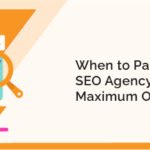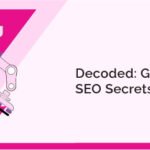With so many marketing tactics available, it can be overwhelming to decide which ones are best for you. Two of the most common and effective tactics are Search Engine Optimization (SEO) and Pay-Per-Click (PPC) advertising.
This blog post, brought to you by SEO St., a leading SEO company, will delve into the world of SEO vs. PPC. We’ll explore the differences between these two strategies, analyze their pros and cons, and ultimately help you decide which approach (or combination!) is best suited for your business needs.
Understanding Search Engine Optimization (SEO)
Let’s begin by understanding how search engines work. When someone types a query into a search engine like Google, the engine crawls and indexes websites to determine which ones are most relevant to the search. The most relevant websites appear at the top of the Search Engine Results Page (SERP), which is prime real estate for businesses.
SEO is the practice of optimizing your website and its content to rank higher in SERPs for relevant keywords. This increases the likelihood of people finding your website organically, without having to pay for clicks. SEO can be broken down into two main categories:
- On-page SEO: This involves optimizing the content and structure of your website itself. This includes using relevant keywords, creating high-quality content, optimizing page titles and meta descriptions, and ensuring a positive user experience.
- Off-page SEO: This focuses on factors outside of your website that influence your ranking. This can involve building backlinks (links from other websites to yours), increasing your domain authority, and improving your website’s speed and mobile-friendliness.
Benefits of SEO:
- Builds Organic Traffic: SEO helps you attract a steady stream of visitors who are actively searching for products or services like yours. This organic traffic is often more qualified and likely to convert into customers.
- Cost-Effective in the Long Run: While SEO requires an initial investment of time and resources, it becomes increasingly cost-effective over time. Once your website ranks high for relevant keywords, you don’t have to pay for each click.
- Improves Brand Credibility: Ranking high in search results organically can boost your brand’s credibility and trustworthiness. People are more likely to trust a website that appears naturally at the top of the SERP compared to a paid advertisement.
- Sustainable Growth: SEO results are long-lasting. Once you achieve a high ranking, it can be maintained with ongoing optimization efforts, ensuring a steady flow of organic traffic.
Drawbacks of SEO:
- Results Take Time: SEO is a long-term strategy. It can take months or even years to see significant results, especially for competitive keywords.
- Highly Competitive: Ranking for popular keywords can be challenging, especially in competitive industries. You’ll need to create high-quality, informative content and consistently optimize your website to stand out from the crowd.
- Algorithm Updates: Search engine algorithms are constantly evolving, which means what works today might not work tomorrow. Staying up-to-date on the latest SEO trends and best practices is crucial for maintaining your ranking.
- Requires Ongoing Work: SEO is not a one-time fix. You need to continuously monitor your website’s performance, identify areas for improvement, and adapt your strategy as needed.
Understanding Pay-Per-Click (PPC) Advertising
PPC advertising is a form of online marketing where you pay a fee each time someone clicks on your ad. These ads typically appear at the top of SERPs, above organic search results, and are often labeled as “Sponsored” or “Ads.”
With PPC, you create targeted ads based on specific keywords and demographics. When someone searches for a term related to your keyword, your ad has the potential to appear in the search results. You only pay when someone clicks on your ad, allowing you to control your advertising budget.
Here’s a breakdown of how PPC advertising works:
- Keyword Research: Identify relevant keywords that your target audience is likely to search for.
- Bidding: Set a maximum amount you’re willing to pay for each click on your ad. The higher your bid, the more likely your ad is to appear in search results.
- Ad Creation: Craft compelling ad copy that entices users to click on your ad and visit your website.
- Landing Page Optimization: Design a high-converting landing page that provides a positive user experience and encourages visitors to take action, such as making a purchase or signing up for a newsletter.
Benefits of PPC:
- Fast Results: Unlike SEO, PPC can deliver immediate results. You can get your ads up and running quickly, driving traffic to your website almost instantly.
- Targeted Audience: With PPC, you can target your ads to a very specific audience based on demographics, interests, and online behavior. This ensures that your ads are reaching people who are most likely to be interested in your products or services.
- Top of Search Results: PPC ads appear at the top of SERPs, giving you prime real estate and maximum visibility. This can be especially beneficial for new businesses or those trying to launch new products or services.
- Measurable Results: PPC campaigns provide detailed analytics that allow you to track the performance of your ads and measure your return on investment (ROI). You can see how many people see your ads, click on them, and convert into leads or customers.
Drawbacks of PPC:
- Costly Long-Term: PPC can be expensive, especially if you’re targeting competitive keywords. You’ll need to continuously monitor your budget and adjust your bids to maintain a positive ROI.
- No Guaranteed Results: Just because your ad appears at the top of the SERP doesn’t guarantee clicks or conversions. The quality of your ad copy, landing page, and overall offer will significantly impact your success.
- Requires Ongoing Management: PPC campaigns need ongoing monitoring and optimization. You’ll need to adjust your bids, keywords, and ad copy to ensure you’re getting the most out of your budget.
- Limited Visibility Once Stopped: Once you stop paying for your PPC campaign, your ads will disappear from search results. Your website traffic will likely decrease if you don’t have a strong SEO strategy in place.
SEO vs. PPC: Choosing the Right Approach
So, SEO or PPC? The answer is: it depends. Both SEO and PPC offer unique advantages and disadvantages. The best approach for your business depends on your specific goals, budget, and industry.
Here’s a quick guide to help you decide:
- For long-term, sustainable growth and organic traffic, focus on SEO.
- For immediate results and targeted advertising, consider PPC.
- For the best of both worlds, leverage a combination of SEO and PPC.
The Power of Combining SEO and PPC
A well-rounded digital marketing strategy often utilizes both SEO and PPC. Here’s how they can work together:
- PPC can jumpstart your SEO efforts: While you wait for your SEO efforts to kick in, PPC can help you drive initial traffic to your website and build brand awareness.
- SEO can sustain your PPC results: Over time, a strong SEO strategy can help you achieve higher organic rankings, reducing your reliance on PPC ads and potentially lowering your overall marketing costs.
- SEO and PPC data can inform each other: Data from your PPC campaigns can inform your keyword research and content creation for SEO.
By combining SEO and PPC, you can create a comprehensive digital marketing strategy that delivers fast results, builds long-term organic traffic, and ultimately helps you achieve your business goals.
Investing in the Right Tools and People
Both SEO and PPC can be complex and ever-evolving. To maximize your success, consider investing in the right tools and people. SEO St. offers a comprehensive range of SEO and PPC services to help businesses achieve their online marketing goals. Our team of experienced professionals can help you:
- Develop a customized SEO strategy to improve your website’s ranking and organic traffic.
- Create high-quality content that engages your target audience and drives conversions.
- Launch and manage effective PPC campaigns that reach the right people at the right time.
- Track and analyze your results to ensure you’re getting the most out of your marketing budget.
Conclusion
By understanding the differences between SEO and PPC, you can make informed decisions about which approach is best for your business. Remember, the most successful digital marketing strategies often leverage a combination of both SEO and PPC.
If you’re looking to take your online presence to the next level, contact SEO St. today. We’ll help you develop a comprehensive digital marketing plan that drives results and helps you achieve your business goals.
Ready to learn more?
- Check out our blog for informative articles on SEO, PPC, and other digital marketing topics.
- Download our free SEO guide to learn the basics of search engine optimization.
- Contact us today for a free consultation to discuss your specific needs.
We hope this blog post has been helpful!




